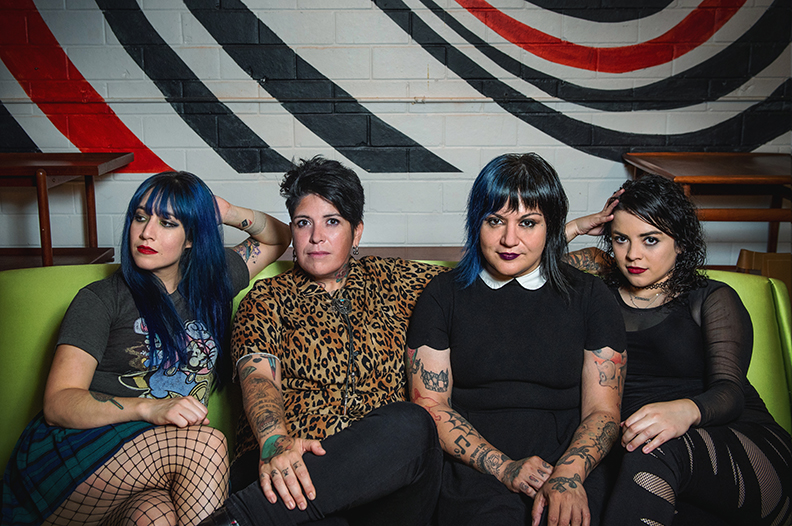FEA
San Antonio-based band Fea embody one of the most vital tenets of punk: total and unapologetic freedom, fearlessly expressed with both fury and joy. Produced by Chicana punk legend Alice Bag, their sophomore album No Novelties finds Fea following their instincts into entirely unexpected directions (e.g., covering an early-’90s pop anthem from Mexican superstar Gloria Trevi, trash-talking en Français on a yé-yé-inspired track called “Merde”). But even in its most playful moments, No Novelties channels a classic-punk ferocity, endlessly backing Fea’s sticky melodies with breakneck rhythms, blistering guitar riffs, and boldly nuanced vocal work.
The follow-up to their self-titled debut –a 2016 release that prompted Iggy Pop to praise Fea in the pages of Rolling Stone, with the Village Voice ranking “No Hablo Espanol” among the year’s best protest songs—No Novelties takes its title from the album-closing “Girl Band.” “It’s referring to that stereotype of how female bands are some kind of novelty with no real talent,” says Lopez. “But that’s not us at all: we know how to play our instruments, we know how to write great songs. So ‘Girl Band’ is basically a middle finger to anyone who underestimates us.”
Recording at Sonic Ranch (a studio in the Texas border town of Tornillo), Fea brought both raw intensity and greater complexity to the making of No Novelties, composing more intricately layered arrangements and pushing into heavier emotional terrain than ever before. On lead single “Let Me Down,” the band offsets their frenetic energy with graceful three-part harmonies, their lyrics speaking to social media’s constant enabling of self-absorption. “Social media is a great platform that could potentially be used in a lot of positive ways, but it’s become this weird thing where everyone just puts themselves on display because they’re so obsessed with getting attention,” says Martinez of the song’s inspiration.
With No Novelties driven by Fea’s naturalistic use of bilingual lyrics, “Ya Se” injects Spanish-sung gang vocals into a cathartic middle-class anthem. “It’s about living paycheck-to-paycheck, and getting caught in that cycle where you don’t make enough money but you spend too much on things you don’t need, just to get some relief from reality,” says Martinez. “It also came from thinking about how a lot of people in our generation are in a worse financial place than our parents, and how sometimes that makes us feel like failures—even though I don’t think it’s necessarily true that we’ve failed.” Elsewhere on the album, Fea turn confessional on songs like “ICU” (a darkly charged portrait of a toxic relationship) and take on a celebratory mood on such tracks as “Itch” (a surf-punk-leaning look at the scuzzy glory of touring). “We don’t glamorize touring in ‘Itch,’ because for us it’s never glamorous,” Martinez points out. “It’s dirty and smelly and uncomfortable and we love it—we always embrace the dirty.”
Born from the ashes of Diaz and Alva’s beloved former band Girl in a Coma, Fea got together in 2015 and soon carved out a kinetic sound shaped by the eclecticism of their homeland. “We all listen to punk and post-punk and riot grrrl music, and we grew up on oldies and Latin music stars and so many other things—so there’s this whole melting-pot effect that definitely comes out in the songs we write,” says Diaz. After putting out their self-titled debut—an album co-produced by Alice Bag, Against Me!’s Laura Jane Grace, and Babes in Toyland’s Lori Barbero—Fea earned acclaim from such outlets as NPR (who hailed the band as “Latina punk at its finest”), and soon began taking their rambunctious live show to venues across the country.
Over the past few years, Fea have toured with both Against Me! and Babes in Toyland, as well as with punk icons Agent Orange. And as their audience continues to expand, the band aims to instill every show with the same sense of solidarity, purpose, and irrepressible fun found in their albums. “We’re serious girls, but there’s a lot of humor involved in everything we do,” says Alva. “We try to put on a really rowdy show; we’re always moving around a lot and always smiling at each other. I think everyone in the crowd can tell we’re having a blast, and hopefully that vibe and energy gets transferred onto them. Our favorite shows are the ones where we can really feel that community between us and the audience.”






